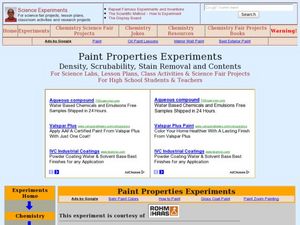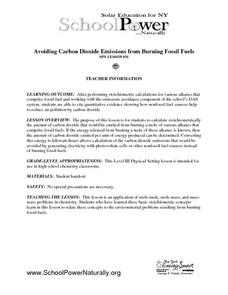Curated OER
Graham's Laws: Diffusion and Effusion of Gases
Learners conduct a series of experiments to explore Graham's law. In this chemistry lesson, students differentiate effusion and diffusion. They perform calculations using Boyle's, Henry's, Charles' and Graham's Laws.
Curated OER
The Stoichiometry Behind Pollution
Students research car emissions of various cars and find the toxins emitted. In this stoichiometry lesson, students calculate the relationship between reactants and products in a chemical reaction. Students collect data on...
Curated OER
Chemical Reactions
In this chemical reactions learning exercise, students solve 16 exercises by writing and balancing chemical reactions. They calculate the concentration of various solutions.
Curated OER
Ammonium Nitrate - Efficient Fertilizers
Students study the chemistry of ammonium nitrate and consider the advantages and disadvantages of this compound. They compare different fertilizers and calculate the molar mass and percent nitrogen in the different fertilizers.
Curated OER
Acid-Base Titrations without Burets
Students analyze the level of acid and base in a titration. In this chemistry lesson plan, students investigate the amount of acid and base required to create certain household chemicals. They perform this activity without the use of...
Curated OER
Quantitative Determination of the Composition of Water-based Paints and the Correlation of Paint Properties to Pain Composition
High schoolers perform a series of tests on water-based paints. In this chemistry lesson, students identify their different functions. They calculate paint density and fractional concentrations.
Curated OER
Molarity Worksheet
Chemistry pros calculate mass, volume, concentration, or molarity of five different solutions. This tidy worksheet makes an appropriate homework assignment when studying molarity.
Virginia Department of Education
Heat Transfer and Heat Capacity
It's time to increase the heat! Young chemists demonstrate heat transfer and heat capacity in an activity-packed lab, showing the transitions between solid, liquid, and gaseous phases of materials. Individuals plot data as the...
Pingry School
Solubility Product of an Ionic Compound
How do scientists determine when a solution is fully saturated? Scholars address the topic as they observe patterns of precipitation in various concentrations of ions. Using a well plate, pipette, and common chemicals, they collect data...
Pingry School
Determination of Molar Mass by Boiling Point Elevation
Francis Raoult discovered the change in boiling points of solutions varies by the number of particles in the solution. Scholars apply the concept to determine the molality of a solution based on the change in boiling point. They use an...
Curated OER
Empirical Formula: From Percentage to Formula
Starting with definitions of empirical and molecular formulas, this slide show guides pupils through the ways to calculate and produce chemical formulas as percentages and molar ratios. A number of examples are given for viewers to try...
Curated OER
Glass Transition in a Rubber Ball
Students illustrate the changes in the properties of a material at its glass transition point. They gather data which they use to construct graphs regarding elastic modules versus absorption modulus, tangent delta, and the effect of...
eGFI
Lesson: Guilt-Free Chocolate
Experiment with chocolate coating on cookies! What a delightful way to learn about food processing and chemical engineering. Throughout this activity, groups collect measurements and make calculations. They conclude by writing...
Curated OER
Chapter 15 Review/Acid-Base Titration and pH
Chemistry stars calculate ion concentrations, pOH, or pH in different solutions. For questions in the latter half of the worksheet, they also have to explain why a solution is acidic, basic, or neutral and solve for molarity of a solute....
Curated OER
#17 Determining the Accuracy of Selected Laboratory Glassware
Students calculate the volume of a specific mass of water placed in selected pieces of common laboratory glassware, using the density formula. They then determine the accuracy of the volumetric measurement for selected pieces of...
South Pasadena AP Chemistry
Acid-Base Equilibria: pH Practice
Across the top of the page is a large Z diagram representing varying degrees of acid-base equilibria. Advanced chemistry classes answer eight questions using the values listed for the H+ and the OH- ions that are part of the...
Polar Trec
What Is My Footprint?
How do one's habits and lifestyle choices affect the environment? Through a short online survey, learners will calculate their own carbon footprints then determine how to reduce their impact on the environment through simple steps, such...
Cornell University
Thin Films
Combine mathematics and science to calculate measurements of unmeasurable materials. Individuals use knowledge of density and volume to determine the thickness of the film used in production. They also apply stoichiometry to...
Curated OER
Avoiding Carbon Dioxide Emissions from Burning Fossil Fuels
Chemistry and earth science meet in a lesson on carbon dioxide emissions. After reading about atmospheric problems caused by using fossil fuels, science stars balance equations for the burning of different alkanes. They compute the...
EngageNY
Events and Venn Diagrams
Time for statistics and learning to overlap! Learners examine Venn Diagrams as a means to organize data. They then use the diagrams to calculate simple and compound probabilities.
Curated OER
# 05 Color Me Analytical
High schoolers are introduced to colorimeter on two levels. They investigate how to physically manipulate the colorimeters. Secondly, the students start on a pathway of discovery to one of the most important principles in analytical...
University of Georgia
Bag O' Isotopes
Accommodate your chemistry class with an experiment that is both entertaining and educational. Through the activity, blossoming chemists perform calculations on various isotopes, as represented by beans and legumes, to obtain...
Kenan Fellows
Half-Life
Scholars shake their way to understanding half-life with the help of candy. They observe and record which side candy lands on to graph the exponential decay in the fifth instructional activity of seven integrating chemistry and algebra....
Kenan Fellows
How Much Heat Can a Phase Change Produce?
Scholars learn about heat release in phase changes. They perform calculations as they compare and contrast a science fiction passage and a home heating application.























